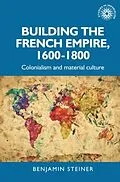This study explores the shared history of the French empire from the perspective of material culture in order to re-evaluate the participation of colonial, Creole, and indigenous agency in the construction of imperial spaces. The decentred approach to a global history of the French colonial realm allows a new understanding of power relations in different locales. Providing case studies from four parts of the French empire, the book draws on illustrative evidence from the French archives in Aix-en-Provence and Paris as well as local archives in each colonial location. The case studies, in the Caribbean, Canada, Africa, and India, each examine building projects to show the mixed group of planners, experts, and workers, the composite nature of building materials, and elements of different 'glocal' styles that give the empire its concrete manifestation. Building the French empire gives a view of the French overseas empire in the early modern period not as a consequence or an outgrowth of Eurocentric state-building, but rather as the result of a globally interconnected process of empire-building.
Autorentext
Benjamin Steiner is Lecturer in Early Modern History at the University of Frankfurt am Main. He is also a member of a research group at the University of Munich
Klappentext
This study explores the shared history of the French empire from a perspective of material culture in order to re-evaluate the participation of colonial, Creole, and indigenous agency in the construction of imperial spaces. The decentred approach to a global history of the French colonial realm allows a new understanding of power relations in different locales. Traditional binary models that assume the centralization of imperial power and control in an imperial centre often overlook the variegated nature of agency in the empire. In a selection of case studies in the Caribbean, Canada, Africa, and India, several building projects show the mixed group of planners, experts, and workers, the composite nature of building materials, and elements of different 'glocal' styles that give the empire its concrete manifestation. Thus the study proposes to view the French overseas empire in the early modern period not as a consequence or an outgrowth of Eurocentric state-building, but rather as the result of a globally interconnected process of empire-building. It also gives a novel approach towards global history that does not privilege certain colonial centres, but opens up space across the boundaries of affirmative colonial historiography and concentrates on the specificity of the place and emotional aspects of community and identity. The book is addressed to those students, scholars, and generally interested public intent on learning more about the functions in early modern colonialism and in particular to those with an interest in French colonial history.
Inhalt
Introduction: Building the French empire1 Colonial enclosure: Fortification and castles on the Lesser Antilles 2 Ambitions to empire in India: Pondichéry as an imperial city in the Mughal state system 3 Decay and repair: Fort Royal as a perennial construction site on Martinique 4 Mixed society and African Rococo: 'French' style in Saint-Louis and on Gorée Island 5 Variegated engineering: The builders of the Caribbean empire 6 Community and segregation in Louisbourg: An 'ideal' colonial city in Atlantic Canada 7 Motley style: Affective buildings and emotional communities on Martinique, Guadeloupe, and Haiti Conclusion: The empire as a material construct Archival Sources Published Sources Bibliography
